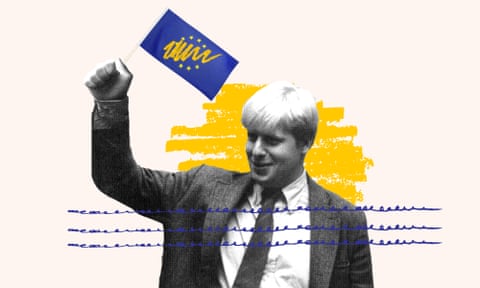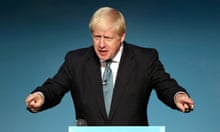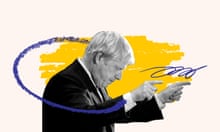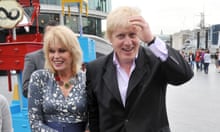It was a classic Boris Johnson dispatch from Brussels – funny, mocking and only partially based on fact.
Under the headline “Italy fails to measure up on condoms”, Johnson revealed in the Daily Telegraph that “Brussels bureaucrats have shown their legendary attention to detail by rejecting new specifications for condom dimensions”, despite demands from the Italian rubber industry for a smaller minimum width. Readers were informed the decision had left “Italian egos smarting”, and he quoted an official spokesperson – Willy Hélin – who insisted “this is a very serious business”.
Quick GuideAbout this series
Show
The real Boris Johnson
Over the course of the week, the Guardian is publishing a series of news reports, features and multimedia components on the man widely expected to be the next Conservative leader – and therefore prime minister. In coverage that ranges from his early days as a journalist to his last senior job as foreign secretary, we will seek to shed light on the exploits, ambitions and values of one of the most consequential – and most divisive – politicians of the age.
That was in 1991. Three decades later, Hélin, now retired, told the Guardian from his hospital bed he was still exasperated by the “load of bullshit” written by Johnson.
“We were not interested by sizes. We had had requests from medical institutions across Europe to check on the safety of condoms. That has nothing to do with the size of dicks. All the journalists went on about comparing the size of penises in Germany and France. It’s about safety, because so many doctors were interested to know about the risks for Aids patients,” he said.
“He was the paramount of exaggeration and distortion and lies. He was a clown – a successful clown.”
In the intervening years, Johnson’s persona has elevated him to the highest stage. But according to those who knew him and worked with him in Brussels, the origins of his performance in those years were a crucial part of his political DNA. His five-year stint in the city as a reporter for the Daily Telegraph, they say, both shaped his politics and influenced the wider British Eurosceptic movement.
Before Johnson’s arrival, Brussels was “a really low-grade” posting for the Telegraph, recalled Nigel Wade, the paper’s foreign editor from 1986 to 1996. “Nobody cared about Brussels,” he said, recalling the city as a source of “important but dull stories”.
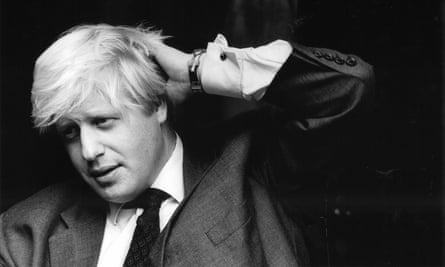
Johnson did not care for important but dull. Colleagues and adversaries say he did not invent the brand of Brussels-bashing British journalism that found niche pieces of European regulation and turned them into front-page stories about threats to the UK’s sovereignty. But he seized on the approach, perfected it and become synonymous with it – helping sow many of the seeds that would later lead to Brexit and his potential rise to become prime minister.
Having graduated from Oxford University and briefly considered becoming a management consultant, he secured a trainee job at the Times after making the (unrelated) journalist Frank Johnson laugh during a New Year’s Eve party held at his fiancee Allegra Mostyn-Owen’s family’s stately home.
Despite being sent for training on the Wolverhampton Express & Star, he was sacked within months after fabricating quotes from his godfather Colin Lucas, a historian, in an attempt to get speculation about Edward II’s supposed lover Piers Gaveston into a front-page news story.
Having again used his contacts to secure a job at the Daily Telegraph, Johnson landed in Brussels, where he had spent a sometimes unhappy time as a child while his father, Stanley, served as one of the first British MEPs. It was 1989 and, aged 24, he already needed to rebuild his career.
One of Johnson’s first professional outings was to meet the UK’s ambassador to the EU, David Hannay. Johnson knew Lord Hannay, who had put Stanley on the shortlist for a job at the European commission years earlier.
As Johnson sat down in his office, “I said: ‘Well, nice to see you Alexander,’” Hannay recalled – Alexander is Johnson’s real first name. “And he said: ‘I’d rather you call me Boris.’ And I did think that was slightly odd, but I didn’t think much more of it at the time.”
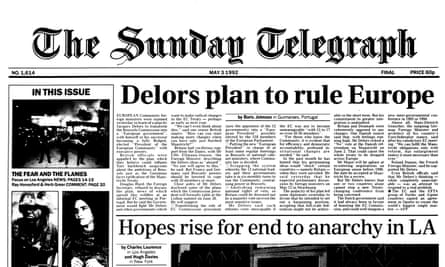
Brussels was where “Boris” first became a public figure, whose articles in the Conservative party’s favourite newspaper were pored over by Tory Eurosceptics embroiled in skirmishes with John Major’s government over the formation of the single market.
Charles Grant, who was working for the Economist in Brussels at the time, said: “It took him time to develop his persona.” He said Johnson arrived as “a fairly conventional” journalist, but “the more he got on the front page, he had to live up to the character he had developed”.
His celebrity grew with stories about “EC [European commission] plans” to construct the world’s tallest building for its headquarters or impose regulations on a reluctant Britain.
Johnson – whose campaign did not respond to a request for comment - “seemed to slightly transcend the normal rigours”, recalled Geoff Meade, a former Press Association correspondent. In one front-page Telegraph story, Johnson reported the European commission’s Berlaymont headquarters would be blown up by the end of 1991. “Sappers will lay explosive charges at key points,” he noted.
It fell to Meade to point out blowing up a building riddled with asbestos might not be a smart move. “It was a great story, but it was complete bollocks,” he said.
Three decades later, the renovated Berlaymont is still standing, and houses many of the individuals who will negotiate with Johnson, should he become prime minister, on Britain’s future relationship with the EU.
The problem was Johnson’s stories about supposedly excessive waste were more entertaining than the dry reports about the creation of the single market.
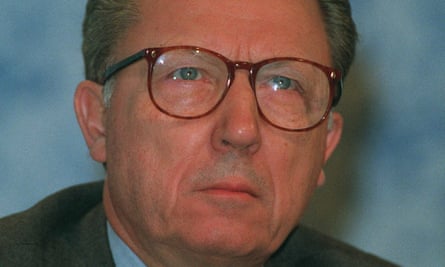
One British EU official, who knew Johnson, said: “Most of the UK press were quite bored by what the commission did. They got what they saw as turgid explanations of market regulation.”
Peter Guilford, a former Times correspondent, received midnight phone calls from London when the first editions of newspapers containing Johnson’s stories landed on editors’ desks. “We are under pressure to follow it up. So there was this sort of Eurosceptic-generating machine that we were all part of, and Boris was driving harder than anyone else,” he said.
Johnson did not invent British Eurosceptic reporting, Guilford said, but “took it to new heights. It delivered him the profile and publicity that he craved.”
Guilford later became spokesman for Leon Brittan, one of two British European commissioners in the early 1990s. He recalled Johnson was often trying to stand up stories of “a German plot against a British commissioner; he was always playing off second world war themes”.Bruno Dethomas, spokesman for the then European commission president, Jacques Delors, said Johnson’s stories were not very different from those of his tabloid rivals. “Boris was of course exaggerating, but more smartly than the others,” he said.
Dethomas discovered this when he invited the young reporter to his house in Brussels for drinks. The soiree later provided inspiration for a Johnson report that Dethomas lived in a castle. “He knew perfectly well that I lived in a normal house with a small garden,” he said. “I was surprised; I found it not absolutely fair, but I knew Boris.”
In those pre-internet days, the Brussels press corp was tight knit. Journalists spent hours together, either in the underground commission press briefing room or in nearby pubs, such as Kitty O’Shea’s and the Old Hack. Johnson also played squash and tennis and went skiing. Guilford said: “He played squash like he does everything: very powerful, not always very accurate – and he skis the same way.”
In his later years in Brussels, Johnson moved closer to the commission headquarters, taking a modest terrace house on Rue Van Campenhout. By coincidence, Neil Kinnock bought the property when he moved to Brussels to become Britain’s European commissioner. “We had no need for contact,” Kinnock said.
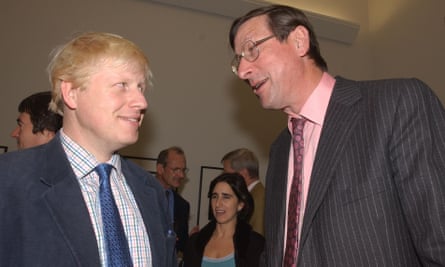
Rolf-Dieter Krause, a former correspondent for Germany’s ARD public broadcaster, recalled Johnson slumped in his chair at the European commission’s daily midday briefings. “If he asked a question, it was to create a laugh … When we read his articles, we always felt he had been to a different event from the one we were at,” he said.
This approach came to a head with a narrow rejection of the EU by angry voters in a referendum, stoked by fears of rule by Brussels and fuelled by Johnson’s writing in the Daily Telegraph. This was 1992 and – almost 25 years before the Brexit vote – Denmark voted down the Maastricht treaty with a majority of 50.7%. Johnson would later claim his front-page story “Delors plans to rule Europe” had helped swing the result.
Uffe Ellemann-Jensen, Denmark’s then foreign minister, thinks Johnson’s writing – picked up by the Danish press – helped influence the result. “It definitely had an impact,” he said. “The story was that once the Danes had voted yes then we would have much more Europe, much more union and all that stuff. When I said it was nonsense, I was called a bloody liar.”
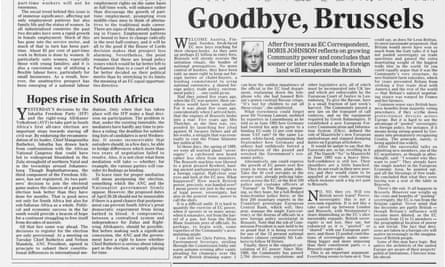
The former minister acknowledged he was quoted accurately in Johnson’s story. But he feels Johnson misrepresented changes proposed by Delors. “The way it was presented is that he had found some secret Delors plan – that was the absurdity of it,” he said.
Many in Brussels found Johnson funny. One British official spoke of a “hilarious exchange” between Johnson and the agriculture commissioner’s spokesman about how bent a banana had to be. Another said: “He was great company, he was great fun, but I used to be very angry with the way he just wanted to ridicule the institution and was clearly misleading people.”
The Daily Telegraph was delighted. Guilford said there were enthusiastic letters from the Telegraph’s then editor, Max Hastings – now a fierce critic – pinned to Johnson’s office wall. For the Telegraph foreign desk, he was “as exasperating as he was brilliant”, Wade said in an unpublished memoir. “On many nights, I would be on the phone begging Boris for the piece he had promised to deliver an hour ago. There was a lot of ‘oh gosh Nigel, golly Nigel’ and ‘for godsakes Boris!’”
Nobody imagined where Johnson’s “annoying” stories would lead, said one of the British officials: “He was more seen as a colourful buffoon figure. But we didn’t realise it was going to set the tone of the British debate.”
Tomorrow: Johnson the MP and writer
